Related Research Articles

The Natural Law Party (NLP) was a United States political party affiliated with the international Natural Law Party. It was founded in 1992, but beginning in 2004 many of its state chapters dissolved. It is still active in Michigan.

The 1876 United States presidential election was the 23rd quadrennial presidential election, held on Tuesday, November 7, 1876, in which Republican nominee Rutherford B. Hayes faced Democrat Samuel J. Tilden. It was one of the most contentious presidential elections in American history and its resolution involved negotiations and compromise between the Republicans and Democrats.
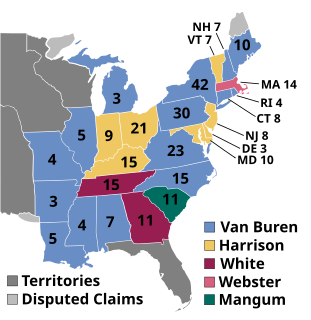
The 1836 United States presidential election was the 13th quadrennial presidential election, held from Thursday, November 3 to Wednesday, December 7, 1836. In the third consecutive election victory for the Democratic Party, incumbent Vice President Martin Van Buren defeated four candidates fielded by the nascent Whig Party.
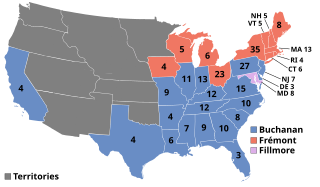
The 1856 United States presidential election was the 18th quadrennial presidential election, held on Tuesday, November 4, 1856. In a three-way election, Democrat James Buchanan defeated Republican nominee John C. Frémont, and Know Nothing nominee and former President Millard Fillmore.

The 1860 United States presidential election was the 19th quadrennial presidential election, held on November 6, 1860. In a four-way contest, the Republican Party ticket of Abraham Lincoln and Hannibal Hamlin, absent from the ballot in ten slave states, won a national popular plurality, a popular majority in the North where states already had abolished slavery, and a national electoral majority comprising only Northern electoral votes. Lincoln's election thus served as the main catalyst of the American Civil War.
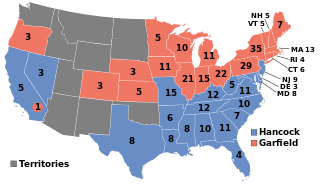
The 1880 United States presidential election was the 24th quadrennial presidential election, held on Tuesday, November 2, 1880. The voter turnout rate was one of the highest in the nation's history.
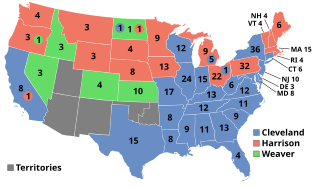
The 1892 United States presidential election was the 27th quadrennial presidential election, held on Tuesday, November 8, 1892. In a rematch of the closely contested 1888 presidential election, former Democratic President Grover Cleveland defeated incumbent Republican President Benjamin Harrison. Cleveland's victory made him the first and to date only person in American history to be elected to a non-consecutive second presidential term. It was also the first time incumbents were defeated in consecutive elections—the second being Jimmy Carter's defeat of Gerald Ford in 1976, followed by Carter's subsequent loss to Ronald Reagan in 1980. Additionally, Harrison's loss marked the second time an elected president lost the popular vote twice, the first being John Quincy Adams in the 1820s. This feat was not repeated until Donald Trump lost the popular vote in 2016 and 2020.

The 1920 United States presidential election was the 34th quadrennial presidential election, held on Tuesday, November 2, 1920. In the first election held after the end of World War I and the first election after the ratification of the Nineteenth Amendment, Republican Senator Warren G. Harding of Ohio defeated Democratic Governor James M. Cox of Ohio.
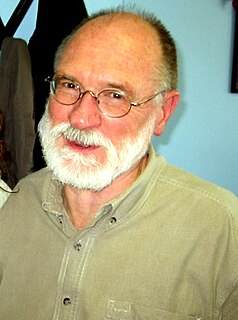
William S. Peirce is an American professor and politician. He was the Libertarian Party of Ohio candidate for Ohio Governor in the November 7, 2006 election. On November 12, 2005, the party made its endorsement of Peirce official.

Elections to the United States House of Representatives for the 10th Congress were held at various dates in each state between April 29, 1806 and August 4, 1807 during Thomas Jefferson's second term with the new Congress meeting on October 26, 1807.
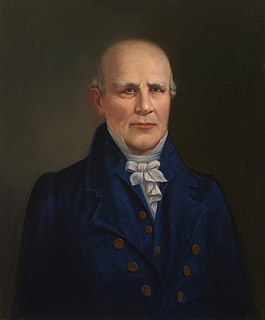
Elections to the United States House of Representatives for the 8th Congress were held at various dates in each state, from April 26, 1802 to December 14, 1803 during Thomas Jefferson's first term in office. It was common in the early years of the United Congress for some states to elect representatives to a Congress after it had already convened. In the case of the 8th Congress, the representatives from New Jersey were only elected after its first meeting on October 17, 1803.
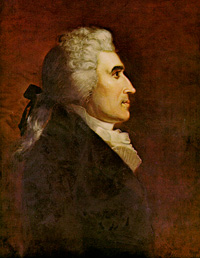
Elections to the United States House of Representatives for the 5th Congress took place in the various states took place between August 12, 1796, and October 15, 1797. The first session was convened on May 15, 1797, at the proclamation of the new President of the United States, John Adams. Since Kentucky and Tennessee had not yet voted, they were unrepresented until the second session.

The 1856 Republican National Convention was a presidential nominating convention that met from June 17 to June 19 in Philadelphia, Pennsylvania. It was the first national nominating convention in the history of the Republican Party, and was held to nominate the party's candidates for president and vice president in the 1856 election. The convention selected former Senator John C. Frémont of California for president and former Senator William L. Dayton of New Jersey for vice president. The convention also appointed the members of the newly-established Republican National Committee.
Williams v. Rhodes, 393 U.S. 23 (1968), was a case before the United States Supreme Court.
The United States Senate elections of 1850 and 1851 were elections which had the Democratic Party lose seats, but retain a majority in the United States Senate.
The United States Senate elections of 1848 and 1849 were elections which had the Democratic Party lose seats but maintain control of the United States Senate.
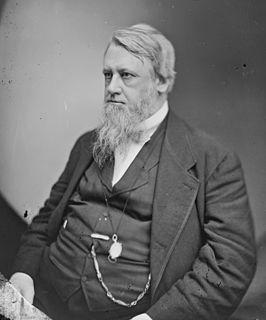
The United States Senate elections of 1876 and 1877 had the Democratic Party gain five seats in the United States Senate, and coincided with Rutherford B. Hayes's narrow election as President. Republicans remained in the majority, however.

The 1876 United States elections were held on November 7. In one of the most disputed presidential elections in American history, Republican Governor Rutherford B. Hayes of Ohio ended up winning despite Democratic Governor Samuel J. Tilden of New York earning a majority of the popular vote. The Republicans maintained their Senate majority and cut into the Democratic majority in the House.

The 1880 United States elections occurred during the Third Party System, and elected the members of the 47th United States Congress. Republicans retained the Presidency and took control of the House. An unclear partisan situation prevailed in the Senate. As the first presidential election after the end of Reconstruction, this election saw the first occurrence of the Democratic Party sweeping the Southern United States; the party would carry an overwhelming majority of Southern states well into the 20th century.
References
| Party political offices | ||
|---|---|---|
| Preceded by Peter Camejo | Socialist Workers Party nominee for President of the United States 1980 | Succeeded by Melvin T. Mason |